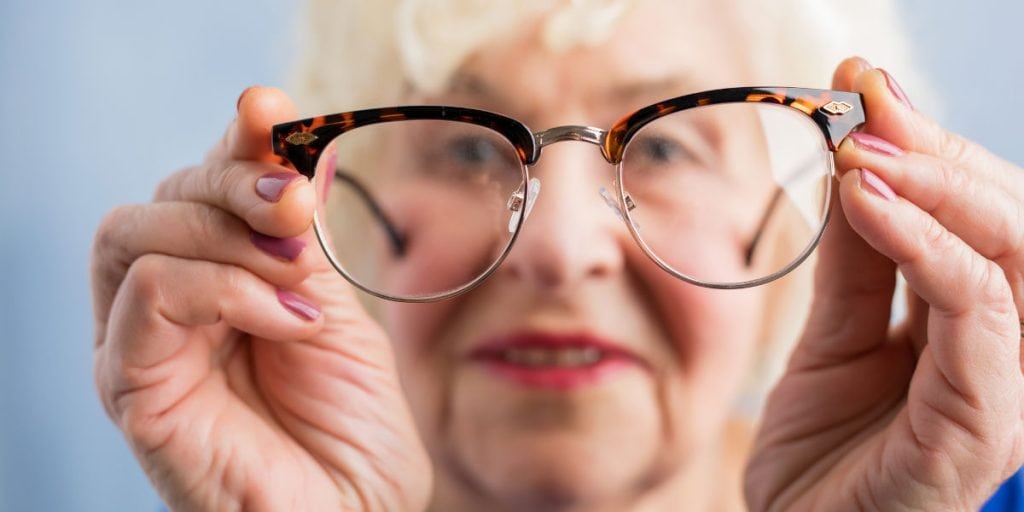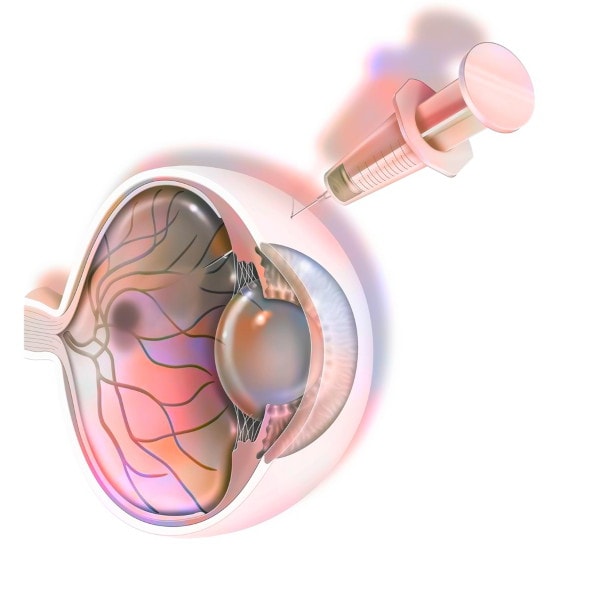As you get older, your vision may become less sharp. There are various age-related vision issues, such as eye floaters, presbyopia, dry eye, and cataracts. However, loss of vision due to age-related macular degeneration (AMD) tends to be the most concerning.
What is age-related vision loss?
Age-related vision loss is the progressive loss of vision that occurs as you age. The term can include cataracts, presbyopia (the inability to see fine print), tearing, glaucoma, floaters, flashers, dry eye, corneal diseases, and retinal detachment.
Though some of these issues can occur at any age, the weakening of your eye as you age may make you more susceptible later in life.

What is macular degeneration?
Age-related macular degeneration or AMD is the leading cause of vision loss in people over 65. Macular degeneration is an eye disease in which aging directly causes damage to the macula. The macula is located in the retina and is the portion of your eye responsible for sharp vision when looking straight ahead.
Low vision caused by AMD may make driving, reading, or seeing faces more difficult.
The exact cause of atrophy and degeneration of the macula is unknown. Contributing factors include family history of the disease and environmental or lifestyle conditions. Some experts suspect that AMD may result from too much of the protein vascular endothelial growth factor (VEGF), which causes abnormal blood vessel growth and leakage.
AMD is among the most common degenerative retinal diseases for older adults, according to the National Eye Institute (NEI). The speed at which it comes on can vary, and its early signs are often difficult to recognize without the help of a professional.
What are the early signs of macular degeneration?
Early signs of macular degeneration depend on your stage and form of AMD. Dry AMD has three stages, while wet AMD is almost always considered late stage.
At first, there may be few to no signs of dry macular generation; especially during the early stages. However, intermediate dry AMD and late-stage dry or wet macular degeneration have telltale symptoms, including:
- Straight lines appear wavy or crooked
- Colors may look less vibrant
- Difficulty seeing in low light
- A growing area of blurriness in your central vision
An ophthalmologist will usually check for drusen (yellow-colored spots that develop under the retina) in your retina and abnormal blood vessels, which are identifiable signs of macular degeneration.
Which macular degeneration is treatable?
When AMD is discovered, a patient’s first question is can macular degeneration be reversed? Unfortunately, you cannot reverse macular degeneration.
Although, there are treatments for dry AMD that can help slow the progression of the disease.
Can wet macular degeneration be reversed? Sadly, there is no wet AMD cure either. Hopefully, it will be reversible in the future as a lot of research is being conducted to find a cure.
What is macular degeneration treatment?
Depending on your stage and type, your eye doctor may recommend different treatments for AMD.
Fortunately, there are new, encouraging results from an age-related eye disease study. A promising study involving dogs with macular degeneration is investigating the possibility of using stem cells to restore vision.
During this process, scientists implanted stem cells into places where the retina experienced damage.
What is retinal regeneration?
The retina sits at the back of the eye and includes the macula. Light entering the eye is focused on the retina’s photoreceptor cells. The retina transmits signals through the optic nerve and your brain converts those signals into sight.

Retinal regeneration aims to reverse vision loss by healing the damaged retina.
Retinal regeneration first focuses on the individual’s stem cells. Retinal precursor cells are believed to be able to replace impaired photoreceptor cells in the patient’s eye. Researchers take cell samples then revert them into stem cells — or pluripotent stem cells (iPS) in the case of retinal regeneration.
iPS cells can be used as the foundation to create nearly any type of cell found in the human body. The doctor can use special treatments to convert the iPS cells to retinal precursor cells. Next, they will inject the cells into the retina, where they should be able to replace any damaged photoreceptors
Even though the process sounds straightforward, there is a lot to consider. Delivering enough retinal precursor cells into the correct area without harming other eye structures can be difficult. Additionally, the innate immune system cannot be activated, or it may pose a risk to the new cells. Finally, for retinal regeneration to be successful, the injected cells must form connections with the surrounding retinal area for vision to be restored.
However, in the latest study, scientists believe they were able to mitigate some of these concerns.
Is this a viable macular degeneration treatment?
It is important to note that the study has not been completed with humans and is likely still far from being ready for human clinical trials. Nevertheless, the study set the foundation for possible future treatment to restore vision to individuals with macular degeneration.
Can you reverse macular degeneration naturally?
Currently, there is no way to naturally reverse or cure either wet or dry macular degeneration. However, macular degeneration surgeries and medications do exist and can lower your risk of vision loss — especially when it’s caught early.
Treatment options can include the AREDS2 formula pill and Lucentis or Avastin medications. Intraocular injections with anti-VEGF medications and laser treatments like Photodynamic therapy are other possible treatments used to correct vision problems. Your doctor may recommend macular degeneration glasses, like prismatic lenses if you are having trouble seeing.
Can macular degeneration be prevented?
Macular degeneration prevention can also include lifestyle changes. Risk factors for the wet and dry forms of macular degeneration include:
- Smoking
- High blood pressure
- High cholesterol
- A diet full of saturated fats
Eating a diet rich in dark leafy greens, fruits with antioxidants, and omega-3 fatty acid foods like cold-water fish is usually recommended to slow or prevent macular degeneration progression
Taking macular degeneration vitamins and supplements for eye health, such as vitamin E, vitamin C, beta carotene, lutein, and zeaxanthin, might prove to be beneficial as well. Additionally, staying fit, controlling high blood pressure, avoiding smoking, and protecting your eyes from the environment may help.
It goes without saying that getting annual eye exams to check for eye conditions like AMD is imperative. Catching the signs of AMD early is the key to preventing further vision loss.
Worried about age-related vision loss? Talk to a doctor at the Assil Gaur Eye Institute
Los Angeles’ leading LASIK, cataract, and glaucoma experts are all available in one place. Our ophthalmology clinic offers state-of-the-art treatments for age-related eye conditions such as glaucoma, macular degeneration, and dry eye.
Assil Gaur Eye Institute remains laser-focused on our founding mission of providing exceptional health care in a compassionate and caring environment. We continue to be driven to advance the field of ophthalmology and give back to our community every day.
Please call (866) 945-2745 or make an appointment online.
We are conveniently located for patients throughout Southern California and the Los Angeles area in or near Beverly Hills, Santa Monica, West Los Angeles, West Hollywood, Culver City, Hollywood, Venice, Marina del Rey, Malibu, Manhattan Beach, and Downtown Los Angeles.
Sources:
Age-related macular degeneration (AMD). (2021). https://www.nei.nih.gov/learn-about-eye-health/eye-conditions-and-diseases/age-related-macular-degeneration
Khoo HE, et al. (2019). Nutrients for prevention of macular degeneration and eye-related diseases. https://www.ncbi.nlm.nih.gov/pmc/articles/PMC6523787/
AREDS 2 supplements for age-related macular degeneration (AMD). (2021).
nei.nih.gov/learn-about-eye-health/eye-conditions-and-diseases/age-related-macular-degeneration/nutritional-supplements-age-related-macular-degeneration













